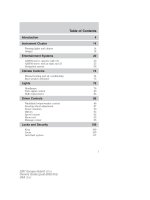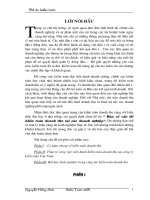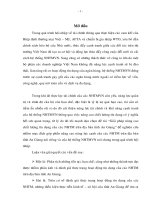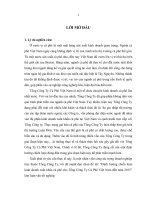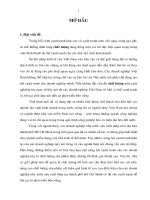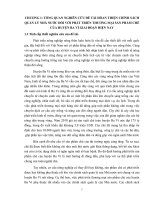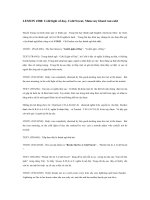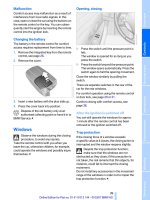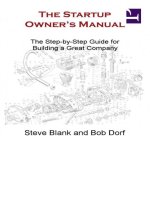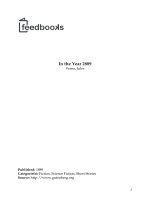OWNER 288
Bạn đang xem bản rút gọn của tài liệu. Xem và tải ngay bản đầy đủ của tài liệu tại đây (96.68 KB, 9 trang )
SƠ GD&ĐT VINH PHUC
TRƯƠNG THPT LIÊN SƠN
(Đề thi gồm: 05 trang)
ĐỀ KTCL ƠN THI THPT QUỐC GIA NĂM 20172018
Mơn: TIẾNG ANH – ĐÊ SỐ 288
Thời gian làm bài: 60 phút, không kể thời gian phát
đề
Ho va tên thi sinh:……………………………………………………………………. SBD:…………………………
Mark the letter A, B, C, or D on your answer sheet to indicate the word that differs from the
other three in the position of primary stress in each of the following questions.
Question 01:A. inference
B. redundancy
C. reference
D. conference
Question 2:A. confident
B. precedent
C. dependent
D. accident
Mark the letter A, B, C, or D on your answer sheet to indicate the word(s) OPPOSITE in
meaning to the underlined word(s) in each of the following questions.
Question 03: I'm sorry to rain on your parade but you're not allowed to have alcohol on the
campus.
A. damage your work B. encourage you
C. keep you sweet D. feel sorry for you
Question 04: John tried to mollify her by giving her a big bunch of roses.
A. harden
B. allay
C. soften
D. exasperate
Mark the letter A, B, C, or D on your answer sheet to indicate the correct answer to each of the
following questions.
Question 05: Worried about the future of the family business, he________ for his sons to follow in his
footsteps.
A. anticipated
B. yearned
C. considered
D. desired
Question 06: ________ should a young child be allowed to play with fireworks without adult
supervision.
A. No sooner than B. Only when
C. Always
D. Under no circumstances
Question 07: Nowadays, violence seems to be a________ occurrence.
A. every day
B. daily
C. up-to-date
D. everyday
Question 08: The Pyramids are perhaps the most famous of the seven________ of the ancient world.
A. spectacles
B. structures
C. wonders
D. constructions
Question 09: The more you study during the semester, ________ the week before exams.
A. the less have you to study
B. the less you have to study
C. the study less you have
D. you have to study the less
Question 10: In order to prove Smith is guilty, we must find some________.
A. evidence
B. information
C. knowledge
D. means
Question 11: He refused to give up work________ he had won a million dollars.
A. as though
B. despite
C. however
D. even though
Question 12: Mary is completely ________ with her wedding plans.
A. appeased
B. enjoined
C. obsessed
D. dispended
Question 13: ________ on barren slopes can help prevent erosion.
A. Planting trees
B. For trees to be planted
C. Trees are planted
D. In order to plant trees
Question 14: We rarely see________ on most matters of business policy.
A. at loggerheads
B. on tenterhooks
C. eye to eye
D. face to face
Question 15: ________ is a valid form of pest control has come under attack.
A. It is the hunting of foxes from horseback
B. The hunting of foxes from horseback
C. There is fox hunting from horseback
D. That the hunting of foxes from horseback
Question 16: The goalie tried to catch_________ ball, but he failed.
A. a
B. an
C. the
D. Ø
Question 17: To judge your friends, you should not listen________ but observe what they do.
A. to way they say B. to what they say C. to which they say D. to what they are saying.
Mark the letter A, B, C, or D on your answer sheet to indicate the sentence that best completes
each of the following exchanges.
Question 18: ~ Sarah: “____________”
~ Modric: “Yes, I agree, but being successful doesn't just mean making a lot of money.”
A. Am I able to become a billionaire some day?
B. Don’t you think you’ve been successful in your business?
C. I don’t think David has made a mint.
D. It's so important to recognize real achievement, don't you?
Question 19: ~ Lane: “Tom and I were interviewed on TV last Sunday.” ~ Charton: “____________”
A. Incredible! It was televised all over the world. B. What on earth is it for?
C. It’s the second show I’ve seen this week.
D. You both look akin to brothers.
Mark the letter A, B, C, or D on your answer sheet to indicate the word(s) CLOSEST in meaning
to the underlined word(s) in each of the following questions.
Question 20: The maintenance of these old castles must cost a lot of money.
A. building
B. foundation
C. destruction
D. preservation
Question 21: People in the mountainous areas are still in the habit of destroying forests for
cultivation.
A. planting
B. farming
C. industry
D. wood
Read the following passage and mark the letter A, B, C, or D on your answer sheet to indicate
the correct answer to each of the questions from 22 to 28.
With the advent of the computer age, it was rashly predicted by computer manufacturers
that technology would help to save trees and create a paperless office. Unfortunately, far from
cutting down on the amount of paper used, we now use 10% more paper than we did before, a lot
of which is used for printing out web pages and e-mails.
Despite all this, computer companies are still insisting that conventional books will soon
disappear, to be replaced by the handheld e-book. For one particular version of the e-book
available at the moment, you hold your laptop like a book and read the book that you have bought
and downloaded over the Internet. It is very doubtful, however, whether this means that the
ordinary reader is going to give up using books made of paper that easily. Trying to read an e-book
in bright sunshine on a beach, with the sun reflecting off the screen and when its batteries may be
running down is hardly a recipe for a relaxed and carefree vacation. Basically, there is nothing so
easy to use as the common-or-garden paperback novel - and it will take a lot to replace it!
There may still be something to be said for e-books when it comes to weighty academic
volumes that students need to refer to for their studies. Instead of having to carry them around or
physically go to a library to read them, they would be able to download the sections they needed
and use them on-screen or print them out.
Changes will probably take place anyway in conventional publishing, with the
incorporation of digital printing techniques. It may soon be possible to have a particular book
printed on demand over the Net, using digital copies of the work provided by the publisher.
Perhaps in this way we will eventually be able to reduce our consumption of paper.
Question 22: The word “rashly” is closest in meaning to_________.
A. thoughtlessly
B. hastily
C. awkwardly D. inconsiderately
Question 23: What argument did the computer makers use to support the widespread use of
computers?
A. Offices would find their work cut by 10%.
B. Trees would no longer have to be cut down to make paper.
C. Their use would have significant ecological value.
D. Conventional books would gradually die out.
Question 24: What disadvantage of the e-book does the author point out?
A. It has to have a power supply.
B. It is not relaxed
C. It's rather heavy to hold.
D. It can't be taken onto the beach.
Question 25: According to the passage, e-books_________.
A. will be used more for leisure reading. B. are unlikely to be used by anyone.
C. are not at all a good idea.
D. may be useful when reading for reference.
Question 26: In the passage, the author says that_________
A. laptops are a convenient way to read a novel.
B. conventional books will soon become a thing of the past.
C. the general reader is reluctant to give up using conventional books.
D. readers will easily get used to e-books.
Question 27: The pronoun “it” refers to_________
A. a laptop screen
B. a recipe for relaxation
C. a paper-back book
D. a carefree vacation
Question 28: In what way does the author suggest that the amount of paper we use might be
reduced?
A. by selling books over the Internet
B. by creating a paperless office
C. by involving publishers in the printing of books
D. by only having a book printed when someone requests it
Mark the letter A, B, C, or D on your answer sheet to indicate the word whose underlined part
differs from the other three in pronunciation in each of the following questions.
Question 29: A. stein
B. leitmotiv
C. seismograph
D. seizure
Question 30: A. flow
B. shower
C. crow
D. brow
Read the following passage and mark the letter A, B, C, or D on your answer sheet to indicate
the correct answer to each of the questions from 31 to 37.
LOST AND FOUND
Saroo was a five-year-old boy from a town in central India. His family was poor so he didn't
·go to school as he had to work instead, cleaning trains. One night in 1986, he was working on a
train with his older brother when he felt very tired. So he got off the train, sat down and fell
asleep. When he woke up, he rushed back to the train and looked for his brother. Unfortunately, he
couldn't find him anywhere. He sat down on the train and fell asleep again. He woke up 14 hours
later when the train stopped. He heard the roar of traffic and people shouting. This was the sound
of Calcutta, India's third largest city. Saroo was in trouble. He couldn't read or write and he didn't
know the name of his hometown. He just had a photo of himself. Luckily, an orphanage took him
in, and an Australian couple adopted him and took him to Tasmania, in Australia. He grew up, took
a business degree.
30-yearold Saroo was happy, but he often thought about his lost family in India. How could
he find them again? He only had his childhood memories. Suddenly he had an idea. He calculated
that in 14 hours a train could travel about 1,200 km. So he drew a circle on a map around Calcutta.
And then he used Google Earth™ to search for train stations.
Incredibly, while he was looking at the photos on his screen, he saw a waterfall where he
used to play as a child. He zoomed into the town, which was called Khandwa, and he recognized
his family home. He few to Khandwa. The sounds and the smells were so familiar. Sadly, his old
home was empty - but he showed his photo to people and told his story. Luckily, they knew his
mother. So amazingly, after 25 years, Saroo and his mother were reunited.
Question 31: How could he find his home land?
A. surfing the Internet
B. using a map of Calcutta
C. using his own ideas
D. travelling 1,200 km
Question 32: This article is about_________.
A. Saroo’s childhood
B. how Saroo found his way home
C. when Saroo lost his way home
D. how Saroo worked on a train
Question 33: Which helped him to recognize his home town from the photos?
A. the waterfall
B. the train stations
C. the native people from the photos
D. the sounds and smells of the photos
Question 34: He became an adopted child in_________.
A. an orphanage
B. an Australian family
C. in Tasmania D. in a business company
Question 35: What does the writer imply when telling this story?
A. a childhood memory
B. just an anecdote
C. no place is sweeter than home
D. a child’s intelligence
Question 36: He didn't know the name of his hometown because_________.
A. he caught the wrong train B. he was too tired C. he was illiterate D. he was blind
Question 37: When he wasn’t able to find his brother, he_________.
A. rushed about to find him
C. he went to Calcutta
B. went on to sleep aboard the train
D. got on the train
Read the following passage and mark the letter A, B, C, or D on your answer sheet to indicate
the correct word or phrase that best fits each of the numbered blanks from 38 to 42.
Hilton International, owner of many of the world's most luxurious hotels, has joined the
race to build the first hold on the moon, bringing a new meaning to the expression "five-star".
Called the Lunar Hilton, the huge place would have (37)_______ 5,000 rooms. It would be
powered by two enormous solar panels and would have its own beach and sea as well as a
working farm. The company (38)_______ architects to design the building following the discovery of
water on the moon. It is working (39)_______ with experts at NASA on rhe project and hopes to
form a partnership which would be able to fly guests to the hotel.
Hilton has spent little more than £100.000 on the project so far, (40)_______ compared wilh
the £25 million. Peter Inston, the British architect who has developed the Hilton’s plans, proposes
a 325-metre-high complex with restaurants, a medical centre, a church and even a primary school.
All (42)_______ water would be pumped up from the ice reserves, which would also be used to fill
the sea.
[Adapted from KNOCK-OUT, Workbook, Oxford, 2009]
Question 38: A. beyond
B. over
C. above
D. past
Question 39: A. enquired B. asked
C. demanded
D. said
Question 40: A. nearly
B. closely
C. hardly
D. similarly
Question 41: A. although
B. despite
C. while
D. however
Question 42: A. used
B. drinking
C. sweet
D. falling
Mark the letter A, B, C, or D on your answer sheet to indicate the underlined part that needs
correction in each of the following questions.
Question 43: The weather is usually very disagreeable from June in this part of the country.
A. from
B. disagreeable
C. the
D. in
Question 44: Can’t you think of anything more intelligent to tell?
A. more intelligent B. of
C. Can’t
D. tell
Question 45: Neither my parents nor my eldest brother enjoy watching thrillers on TV.
A. nor
B. thrillers on
C. eldest
D. enjoy
Mark the letter A, B, C, or D on your answer sheet to indicate the sentence that is closest in
meaning to each of the following questions.
Question 46: Jake always beats me at tennis.
A. Jake keeps defeating me at tennis.
B. Playing tennis with Jakes is often exciting.
C. Jakes and I often fights over playing tennis.
D. I always admire Jake in playing tennis with him.
Question 47: You're not allowed to go on the court if you're not wearing the right shoes.
A. You mustn't go on the court on the court if you're not wearing the right shoes.
B. You do not permit to be at the court if you're wearing shoes the right way.
C. Wearing the right shoes will allow you to enter the court.
D. You are not permitted to play court to anybody wearing the right shoes.
Question 48: It's not necessary to watch the game tomorrow if you don't want to.
A. You don't need watching the game tomorrow if you don't want to.
B. You don't have to watch the game tomorrow if you don't want to.
C. The game tomorrow doesn't need you to watch if you don't want to.
D. Watching the game tomorrow doesn't need you whether you want to or not.
Mark the letter A, B, C, or D on your answer sheet to indicate the sentence that best combines
each pair of sentences in the following questions.
Question 49: Mike graduated with a good degree. However, he joined the ranks of the unemployed.
A. If Mike graduated with a good degree, he would join the ranks of the unemployed.
B. That Mike graduated with a good degree helped him join the ranks of the unemployed.
C. Mike joined the ranks of the unemployed because he graduated with a good degree.
D. Although Mike graduated with a good degree, he joined the ranks of the unemployed.
Question 50: Nam defeated the former champion in three sets. He finally won the inter-school table
tennis championship.
A. Although Nam defeated the former champion in three sets, he did not win the title of
inter- school table tennis championship.
B. Being defeated the former champion in three sets, Nam lost the chance to play the final
games of inter-school table tennis championship.
C. Having defeated the former champion in three sets, Nam did not hold the title of
champion.
D. Having defeated the former champion in three sets, Nam won the inter-school table
tennis championship.
________THE END_______
SƠ GD&ĐT VINH PHUC
TRƯƠNG THPT LIÊN SƠN
(Đề thi gồm: 05 trang)
ĐỀ KTCL ƠN THI THPT QUỐC GIA NĂM 20172018
Mơn: TIẾNG ANH – ĐÊ SỐ 288
Thời gian làm bài: 60 phút, không kể thời gian phát
đề
Ho va tên thi sinh:……………………………………………………………………. SBD:…………………………
Mark the letter A, B, C, or D on your answer sheet to indicate the word that differs from the
other three in the position of primary stress in each of the following questions.
Question 01:A. inference
B. redundancy
C. reference
D. conference
Question 2:A. confident
B. precedent
C. dependent
D. accident
Mark the letter A, B, C, or D on your answer sheet to indicate the word(s) OPPOSITE in
meaning to the underlined word(s) in each of the following questions.
Question 03: I'm sorry to rain on your parade but you're not allowed to have alcohol on the
campus.
A. damage your work B. encourage you
C. keep you sweet D. feel sorry for you
Question 04: John tried to mollify her by giving her a big bunch of roses.
A. harden
B. allay
C. soften
D. exasperate
Mark the letter A, B, C, or D on your answer sheet to indicate the correct answer to each of the
following questions.
Question 05: Worried about the future of the family business, he________ for his sons to follow in his
footsteps.
A. anticipated
B. yearned
C. considered
D. desired
Question 06: ________ should a young child be allowed to play with fireworks without adult
supervision.
A. No sooner than B. Only when
C. Always
D. Under no circumstances
Question 07: Nowadays, violence seems to be a________ occurrence.
A. every day
B. daily
C. up-to-date
D. everyday
Question 08: The Pyramids are perhaps the most famous of the seven________ of the ancient world.
A. spectacles
B. structures
C. wonders
D. constructions
Question 09: The more you study during the semester, ________ the week before exams.
A. the less have you to study
B. the less you have to study
C. the study less you have
D. you have to study the less
Question 10: In order to prove Smith is guilty, we must find some________.
A. evidence
B. information
C. knowledge
D. means
Question 11: He refused to give up work________ he had won a million dollars.
A. as though
B. despite
C. however
D. even though
Question 12: Mary is completely ________ with her wedding plans.
A. appeased
B. enjoined
C. obsessed
D. dispended
Question 13: ________ on barren slopes can help prevent erosion.
A. Planting trees
B. For trees to be planted
C. Trees are planted
D. In order to plant trees
Question 14: We rarely see________ on most matters of business policy.
A. at loggerheads
B. on tenterhooks
C. eye to eye
D. face to face
Question 15: ________ is a valid form of pest control has come under attack.
A. It is the hunting of foxes from horseback
B. The hunting of foxes from horseback
C. There is fox hunting from horseback
D. That the hunting of foxes from horseback
Question 16: The goalie tried to catch_________ ball, but he failed.
A. a
B. an
C. the
D. Ø
Question 17: To judge your friends, you should not listen________ but observe what they do.
A. to way they say B. to what they say C. to which they say D. to what they are saying.
Mark the letter A, B, C, or D on your answer sheet to indicate the sentence that best completes
each of the following exchanges.
Question 18: ~ Sarah: “____________”
~ Modric: “Yes, I agree, but being successful doesn't just mean making a lot of money.”
A. Am I able to become a billionaire some day?
B. Don’t you think you’ve been successful in your business?
C. I don’t think David has made a mint.
D. It's so important to recognize real achievement, don't you?
Question 19: ~ Lane: “Tom and I were interviewed on TV last Sunday.” ~ Charton: “____________”
A. Incredible! It was televised all over the world. B. What on earth is it for?
C. It’s the second show I’ve seen this week.
D. You both look akin to brothers.
Mark the letter A, B, C, or D on your answer sheet to indicate the word(s) CLOSEST in meaning
to the underlined word(s) in each of the following questions.
Question 20: The maintenance of these old castles must cost a lot of money.
A. building
B. foundation
C. destruction
D. preservation
Question 21: People in the mountainous areas are still in the habit of destroying forests for
cultivation.
A. planting
B. farming
C. industry
D. wood
Read the following passage and mark the letter A, B, C, or D on your answer sheet to indicate
the correct answer to each of the questions from 22 to 28.
With the advent of the computer age, it was rashly predicted by computer manufacturers
that technology would help to save trees and create a paperless office. Unfortunately, far from
cutting down on the amount of paper used, we now use 10% more paper than we did before, a lot
of which is used for printing out web pages and e-mails.
Despite all this, computer companies are still insisting that conventional books will soon
disappear, to be replaced by the handheld e-book. For one particular version of the e-book
available at the moment, you hold your laptop like a book and read the book that you have bought
and downloaded over the Internet. It is very doubtful, however, whether this means that the
ordinary reader is going to give up using books made of paper that easily. Trying to read an e-book
in bright sunshine on a beach, with the sun reflecting off the screen and when its batteries may be
running down is hardly a recipe for a relaxed and carefree vacation. Basically, there is nothing so
easy to use as the common-or-garden paperback novel - and it will take a lot to replace it!
There may still be something to be said for e-books when it comes to weighty academic
volumes that students need to refer to for their studies. Instead of having to carry them around or
physically go to a library to read them, they would be able to download the sections they needed
and use them on-screen or print them out.
Changes will probably take place anyway in conventional publishing, with the
incorporation of digital printing techniques. It may soon be possible to have a particular book
printed on demand over the Net, using digital copies of the work provided by the publisher.
Perhaps in this way we will eventually be able to reduce our consumption of paper.
Question 22: The word “rashly” is closest in meaning to_________.
A. thoughtlessly
B. hastily
C. awkwardly D. inconsiderately
Question 23: What argument did the computer makers use to support the widespread use of
computers?
A. Offices would find their work cut by 10%.
B. Trees would no longer have to be cut down to make paper.
C. Their use would have significant ecological value.
D. Conventional books would gradually die out.
Question 24: What disadvantage of the e-book does the author point out?
A. It has to have a power supply.
B. It is not relaxed
C. It's rather heavy to hold.
D. It can't be taken onto the beach.
Question 25: According to the passage, e-books_________.
A. will be used more for leisure reading. B. are unlikely to be used by anyone.
C. are not at all a good idea.
D. may be useful when reading for reference.
Question 26: In the passage, the author says that_________
A. laptops are a convenient way to read a novel.
B. conventional books will soon become a thing of the past.
C. the general reader is reluctant to give up using conventional books.
D. readers will easily get used to e-books.
Question 27: The pronoun “it” refers to_________
A. a laptop screen
B. a recipe for relaxation
C. a paper-back book
D. a carefree vacation
Question 28: In what way does the author suggest that the amount of paper we use might be
reduced?
A. by selling books over the Internet
B. by creating a paperless office
C. by involving publishers in the printing of books
D. by only having a book printed when someone requests it
Mark the letter A, B, C, or D on your answer sheet to indicate the word whose underlined part
differs from the other three in pronunciation in each of the following questions.
Question 29: A. stein
B. leitmotiv
C. seismograph
D. seizure
Question 30: A. flow
B. shower
C. crow
D. brow
Read the following passage and mark the letter A, B, C, or D on your answer sheet to indicate
the correct answer to each of the questions from 31 to 37.
LOST AND FOUND
Saroo was a five-year-old boy from a town in central India. His family was poor so he didn't
·go to school as he had to work instead, cleaning trains. One night in 1986, he was working on a
train with his older brother when he felt very tired. So he got off the train, sat down and fell
asleep. When he woke up, he rushed back to the train and looked for his brother. Unfortunately, he
couldn't find him anywhere. He sat down on the train and fell asleep again. He woke up 14 hours
later when the train stopped. He heard the roar of traffic and people shouting. This was the sound
of Calcutta, India's third largest city. Saroo was in trouble. He couldn't read or write and he didn't
know the name of his hometown. He just had a photo of himself. Luckily, an orphanage took him
in, and an Australian couple adopted him and took him to Tasmania, in Australia. He grew up, took
a business degree.
30-yearold Saroo was happy, but he often thought about his lost family in India. How could
he find them again? He only had his childhood memories. Suddenly he had an idea. He calculated
that in 14 hours a train could travel about 1,200 km. So he drew a circle on a map around Calcutta.
And then he used Google Earth™ to search for train stations.
Incredibly, while he was looking at the photos on his screen, he saw a waterfall where he
used to play as a child. He zoomed into the town, which was called Khandwa, and he recognized
his family home. He few to Khandwa. The sounds and the smells were so familiar. Sadly, his old
home was empty - but he showed his photo to people and told his story. Luckily, they knew his
mother. So amazingly, after 25 years, Saroo and his mother were reunited.
Question 31: How could he find his home land?
A. surfing the Internet
B. using a map of Calcutta
C. using his own ideas
D. travelling 1,200 km
Question 32: This article is about_________.
A. Saroo’s childhood
B. how Saroo found his way home
C. when Saroo lost his way home
D. how Saroo worked on a train
Question 33: Which helped him to recognize his home town from the photos?
A. the waterfall
B. the train stations
C. the native people from the photos
D. the sounds and smells of the photos
Question 34: He became an adopted child in_________.
A. an orphanage
B. an Australian family
C. in Tasmania D. in a business company
Question 35: What does the writer imply when telling this story?
A. a childhood memory
B. just an anecdote
C. no place is sweeter than home
D. a child’s intelligence
Question 36: He didn't know the name of his hometown because_________.
A. he caught the wrong train B. he was too tired C. he was illiterate D. he was blind
Question 37: When he wasn’t able to find his brother, he_________.
A. rushed about to find him
B. went on to sleep aboard the train
C. he went to Calcutta
D. got on the train
Read the following passage and mark the letter A, B, C, or D on your answer sheet to indicate
the correct word or phrase that best fits each of the numbered blanks from 38 to 42.
Hilton International, owner of many of the world's most luxurious hotels, has joined the
race to build the first hold on the moon, bringing a new meaning to the expression "five-star".
Called the Lunar Hilton, the huge place would have (37)_______ 5,000 rooms. It would be
powered by two enormous solar panels and would have its own beach and sea as well as a
working farm. The company (38)_______ architects to design the building following the discovery of
water on the moon. It is working (39)_______ with experts at NASA on rhe project and hopes to
form a partnership which would be able to fly guests to the hotel.
Hilton has spent little more than £100.000 on the project so far, (40)_______ compared wilh
the £25 million. Peter Inston, the British architect who has developed the Hilton’s plans, proposes
a 325-metre-high complex with restaurants, a medical centre, a church and even a primary school.
All (42)_______ water would be pumped up from the ice reserves, which would also be used to fill
the sea.
[Adapted from KNOCK-OUT, Workbook, Oxford, 2009]
Question 38: A. beyond
B. over
C. above
D. past
Question 39: A. enquired B. asked
C. demanded
D. said
Question 40: A. nearly
B. closely
C. hardly
D. similarly
Question 41: A. although
B. despite
C. while
D. however
Question 42: A. used
B. drinking
C. sweet
D. falling
Mark the letter A, B, C, or D on your answer sheet to indicate the underlined part that needs
correction in each of the following questions.
Question 43: The weather is usually very disagreeable from June in this part of the country.
A. from
B. disagreeable
C. the
D. in
Question 44: Can’t you think of anything more intelligent to tell?
A. more intelligent B. of
C. Can’t
D. tell
Question 45: Neither my parents nor my eldest brother enjoy watching thrillers on TV.
A. nor
B. thrillers on
C. eldest
D. enjoy
Mark the letter A, B, C, or D on your answer sheet to indicate the sentence that is closest in
meaning to each of the following questions.
Question 46: Jake always beats me at tennis.
A. Jake keeps defeating me at tennis.
B. Playing tennis with Jakes is often exciting.
C. Jakes and I often fights over playing tennis.
D. I always admire Jake in playing tennis with him.
Question 47: You're not allowed to go on the court if you're not wearing the right shoes.
A. You mustn't go on the court on the court if you're not wearing the right shoes.
B. You do not permit to be at the court if you're wearing shoes the right way.
C. Wearing the right shoes will allow you to enter the court.
D. You are not permitted to play court to anybody wearing the right shoes.
Question 48: It's not necessary to watch the game tomorrow if you don't want to.
A. You don't need watching the game tomorrow if you don't want to.
B. You don't have to watch the game tomorrow if you don't want to.
C. The game tomorrow doesn't need you to watch if you don't want to.
D. Watching the game tomorrow doesn't need you whether you want to or not.
Mark the letter A, B, C, or D on your answer sheet to indicate the sentence that best combines
each pair of sentences in the following questions.
Question 49: Mike graduated with a good degree. However, he joined the ranks of the unemployed.
A. If Mike graduated with a good degree, he would join the ranks of the unemployed.
B. That Mike graduated with a good degree helped him join the ranks of the unemployed.
C. Mike joined the ranks of the unemployed because he graduated with a good degree.
D. Although Mike graduated with a good degree, he joined the ranks of the unemployed.
Question 50: Nam defeated the former champion in three sets. He finally won the inter-school table
tennis championship.
A. Although Nam defeated the former champion in three sets, he did not win the title of
inter- school table tennis championship.
B. Being defeated the former champion in three sets, Nam lost the chance to play the final
games of inter-school table tennis championship.
C. Having defeated the former champion in three sets, Nam did not hold the title of
champion.
D. Having defeated the former champion in three sets, Nam won the inter-school table
tennis championship.
________THE END_______
